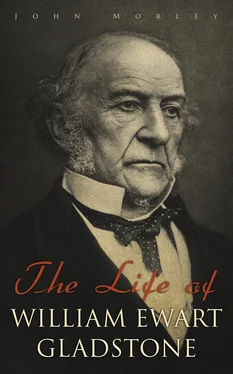There is, of course, a steady refrain of Greek iambics, Greek anapæsts, 'an easy and nice metre,' 'a hodge-podge lot of hendecasyllables,' and thirty alcaic stanzas for a holiday task. Mention is made of many sermons on 'Redeeming the time,' 'Weighed in the balance and found wanting,' 'Cease to do evil, learn to do well,' and the other ever unexhausted texts. One constant entry, we may be sure, is 'Read Bible,' with Mant's notes. In a mood of deep piety he is prepared for confirmation. His appearance at this time was recalled by one who had been his fag, 'as a good-looking, rather delicate youth, with a pale face and brown curling hair, always tidy and well dressed.' 27
He became captain of the fifth at the end of October 1826, and on February 20, 1827, Keate put him into the sixth. 'Was very civil, indeed; told me to take pains, etc.: to be careful in using my authority, etc.' He finds the sixth very preferable to all other parts of the school, both as regards pleasure and opportunity for improvement. They are more directly under the eye of Keate; he treats them with more civility and speaks to them differently. So the days follow one another very much alike—studious, cheerful, sociable, sedulous. The debates in parliament take up a good deal of his time, and he is overwhelmed by the horrible news of the defeat of the catholics in the House of Commons (March 8, 1827). On a summer's day in 1826, 'Mr. Canning here; inquired after me and missed me.' He was not at Eton but at home when he heard of Mr. Canning's death. 'Personally I must remember his kindness and condescension, especially when he spoke to me of some verses which H. Joy had injudiciously mentioned to him.'
Youthful intellect is imitative, and in a great school so impregnated as Eton with the spirit of public life and political association, the few boys with active minds mimicked the strife of parliament in their debating society, and copied the arts of journalism in the Eton Miscellany . In both fields the young Gladstone took a leading part. The debating society was afflicted with 'the premonitory lethargy of death,' but the assiduous energy of Gaskell, seconded by the gifts of Gladstone, Hallam, and Doyle, soon sent a new pulse beating through it. The politics of the hour, that is to say everything not fifty years off, were forbidden ground; but the execution of Strafford or of his royal master, the deposition of Richard II., the last four years of the reign of Queen Anne, the Peerage bill of 1719, the characters of Harley and Bolingbroke, were themes that could be made by ingenious youth to admit a hundred cunning sidelights upon the catholic question, the struggle of the Greeks for independence, the hard case of Queen Caroline, and the unlawfulness of swamping the tories in the House of Lords. On duller afternoons they argued on the relative claims of mathematics and metaphysics to be the better discipline of the human mind; whether duelling is or is not inconsistent with the character that we ought to seek; or whether the education of the poor is on the whole beneficial. It was on this last question (October 29, 1825) that the orator who made his last speech seventy years later, now made his first. 'Made my first or maiden speech at the society,' he enters in his diary, 'on education of the poor; funked less than I thought I should, by much.' It is a curious but a characteristic circumstance not that so many of his Eton speeches were written out, but that the manuscript should have been thriftily preserved by him all through the long space of intervening years. 'Mr. President,' it begins, 'in this land of liberty, in this age of increased and gradually increasing civilization, we shall hope to find few, if indeed any, among the higher classes who are eager or willing to obstruct the moral instruction and mental improvement of their fellow creatures in the humbler walks of life. If such there are, let them at length remember that the poor are endowed with the same reason, though not blessed with the same temporal advantages. Let them but admit, what I think no one can deny, that they are placed in an elevated situation principally for the purpose of doing good to their fellow creatures. Then by what argument can they repel, by what pretence can they evade the duty?' And so forth and so forth. Already we seem to hear the born speaker in the amplitude of rhetorical form in which, juvenile though it may be, a commonplace is cast. 'Is human grandeur so stable that they may deny to others that which they would in an humble situation desire themselves? Or has human pride reached such a pitch of arrogance that they have learned to defy both right and reason, to reject the laws of natural kindness that ought to reign in the breast of all, and to look on their fellow countrymen as the refuse of mankind?... Is it morally just or politically expedient to keep down the industry and genius of the artisan, to blast his rising hopes, to quell his spirit? A thirst for knowledge has arisen in the minds of the poor; let them satisfy it with wholesome nutriment and beware lest driven to despair,' et cetera. Crude enough, if we please; but the year was 1826, and we may feel that the boyish speaker is already on the generous side and has the gift of fruitful sympathies.
In the spacious tournaments of old history, we may smile to hear debating forms and ceremony applied to everlasting controversies. 'Sir,' he opens on one occasion, 'I declare that as far as regards myself, I shall have very little difficulty in stating my grounds on which I give my vote for James Graham [the Marquis of Montrose]. It is because I look upon him as a hero, not merely endowed with that animal ferocity which has often been the sole qualification which has obtained men that appellation from the multitude—I should be sorry indeed if he had no testimonials of his merits, save such as arise from the mad and thoughtless exclamations of popular applause.' In the same gallant style (Jan. 26, 1826) he votes for Marcus Aurelius, in answer to the question whether Trajan has any equal among the Roman emperors from Augustus onwards. Another time the question was between John Hampden and Clarendon. 'Sir, I look back with pleasure to the time when we unanimously declared our disapprobation of the impeachment of the Earl of Strafford. I wish I could hope for the same unanimity now, but I will endeavour to regulate myself by the same principles as directed me then.... Now, sir, with regard to the impeachment of the five members, it is really a little extraordinary to hear the honourable opener talking of the violence offered by the king, and the terror of the parliament. Sir, do we not all know that the king at that time had neither friends nor wealth?... Did the return of these members with a triumphant mob accompanying them indicate terror? Did the demands of the parliament or the insolence of their language show it?' So he proceeds through all the well-worn arguments; and 'therefore it is,' he concludes, 'that I give my vote to the Earl of Clarendon, because he gave his support to the falling cause of monarchy; because he stood by his church and his king; because he adopted the part which loyalty, reason, and moderation combined to dictate.... Poverty, banishment, and disgrace he endured without a murmur; he still adhered to the cause of justice, he still denounced the advocates of rebellion, and if he failed in his reward in life, oh, sir, let us not deny it to him after death. In him, sir, I admire the sound philosopher, the rigid moralist, the upright statesman, the candid historian.... In Hampden I see the splendour of patriotic bravery obscured by the darkness of rebellion, and the faculties by which he might have been a real hero and real martyr, prostituted in the cause,' and so on, with all the promise of the os magna soniturum , of which time was to prove the resources so inexhaustible. On one great man he passed a final judgment that years did not change:—'Debate on Sir R. Walpole: Hallam, Gaskell, Pickering, and Doyle spoke. Voted for him. Last time, when I was almost entirely ignorant of the subject, against him. There were sundry considerable blots, but nothing to overbalance or to spoil the great merit of being the bulwark of the protestant succession, his commercial measures, and in general his pacific policy.' 28
Читать дальше









![William Frith - John Leech, His Life and Work. Vol. 1 [of 2]](/books/747171/william-frith-john-leech-his-life-and-work-vol-thumb.webp)


![William Frith - John Leech, His Life and Work, Vol. 2 [of 2]](/books/748201/william-frith-john-leech-his-life-and-work-vol-thumb.webp)